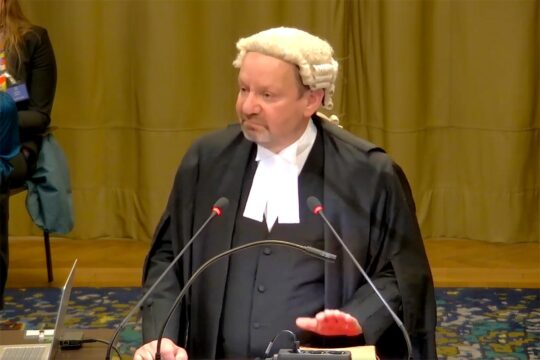The Extraordinary African Chambers in Dakar is to try former Chadian dictator Hissene Habre from Monday for atrocities committed during his presidency.
The special court, created by the African Union under an accord with Senegal, is comprised of two Senegalese judges led by another from Burkina Faso.
The trial will set a historic precedent as until now African leaders accused of atrocities have been tried in international courts.
A long list of international tribunals have been put in place since the 1990s to rule on crimes committed during conflicts:
- The International Criminal Court (ICC) -
The world's only permanent war crimes tribunal, the ICC tries crimes against humanity, genocide and war crimes.
The court came into being in The Hague in 2003 and has opened investigations in eight African countries: the Democratic Republic of Congo, Uganda, Sudan, the Central African Republic, Kenya, Libya, the Ivory Coast and Mali.
It has also opened preliminary probes in other countries, including Georgia, Colombia, Honduras and Ukraine.
In July 2012, the ICC issued its first ever sentence, condemning Congolese warlord Thomas Lubanga to 14 years in prison for using child soldiers in his rebel army.
Ivory Coast's former leader Laurent Gbagbo is the first former head of state to be prosecuted by the court.
Among serving African leaders, the ICC has charged Sudanese President Omar al-Bashir, who is wanted for war crimes and genocide.
- The former Yugoslavia -
The International Criminal Tribunal for the Former Yugoslavia, based in The Hague, was created in May 1993 by the United Nations Security Council to try those accused of warcrimes, crimes against humanity and genocide during the conflicts following the break-up of Yugoslavia.
Former Yugoslav president Slobodan Milosevic, who died on March 11, 2006, while in prison in The Hague, was the first former head of state to be put on trial by the international justice system.
The former Bosnian Serb political and military chiefs Radovan Karadzic and Ratko Mladic are currently on trial.
- Rwanda -
The UN set up the International Criminal Tribunal for Rwanda, based in Arusha, Tanzania, in November 1994 to try the main perpetrators of the 1994 Rwanda genocide in which 800,000 died, mainly ethnic minority Tutsis and moderate Hutus.
The court has sentenced several dozen people,
Originally due to shut on December 31, 2014 it has remained partly open to hear appeals up to August 2015.
- Sierra Leone -
Sierra Leone's special court, set up in Freetown after the signature of an accord between the UN and the government on January 16, 2002, was established to try those who bore the "greatest responsibility" for atrocities during the country's 1991-2001 war.
Liberian ex-president Charles Taylor, whose trial was transferred to The Hague, was sentenced to 50 years in jail on May 30, 2012, confirmed on appeal, for arming Sierra Leone's rebels in return for "blood diamonds" during the brutal war, which claimed 120,000 lives. It was the first judgement against a former head of state by an international court since the Nuremberg Nazi trials in 1946.
- Lebanon -
The UN-backed Special Tribunal for Lebanon, created by a 2007 UN Security Council resolution at Lebanon's request, opened its doors in 2009 and is tasked with trying those suspected of responsibility for the 2005 assassination of former Lebanese premier Rafiq Hariri.
The tribunal is based outside The Hague and is the first international court to accommodate trials in absentia, where the accused is not present.
Since January 2014, the court has tried in their absence five members of Lebanon's powerful Shiite movement Hezbollah, which has vowed that none of the men will ever be caught.
- Cambodia -
Cambodia and the UN signed an agreement in 2003 to establish the tribunal, known as the Extraordinary Chambers in the Courts of Cambodia, a complex hybrid court combining elements of international and domestic law.
Its mandate is to prosecute senior leaders of the Khmer Rouge and "those most responsible" for the genocide committed between 1975 and 1979.
In August 2014 the two top surviving Khmer Rouge leaders, Nuon Chea and Khieu Samphan, were sentenced to life in prison by the court for crimes against humanity.


